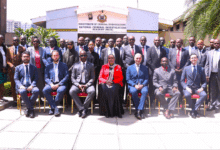Africa Stablecoin Summit 2025 Paves the Way for Digital Finance Innovation

On 12 and 13 November 2025, Johannesburg played host to the Africa Stablecoin Summit 2025, a landmark event highlighting how stablecoins can advance financial inclusion, streamline trade, and strengthen economic resilience. Powered by Binance and supported by Tether, VISA, and Telcoin, the summit brought together over 300 senior leaders, including representatives from central and commercial banks, blockchain infrastructure providers, stablecoin issuers, fintech innovators, and international organizations. Delegates came from countries such as Kenya, Ghana, Nigeria, Uganda, Zambia, and South Africa, alongside global institutions including the United Nations, the Pan-African Payment and Settlement System (PAPSS), and the International Monetary Fund (IMF).
The summit, held under the theme “Harnessing Stablecoins for Africa’s Economic Resilience,” combined strategic discussions with practical insights. Panels examined Pan-African regulatory frameworks, real-world applications in fintech, trade, and SMEs, and lessons from initiatives such as South Africa’s Project Khokha and the U.S. GENIUS Act, while startup-focused sessions explored the technical and operational foundations for scaling stablecoin infrastructure across the continent.
Highlighting the importance of stablecoins in Africa’s fast-growing digital economy, Larry Cooke, Africa Head of Legal at Binance, said, “Stablecoins are more than a technological innovation. They are a pathway to inclusive, cross-border financial systems that can empower businesses and individuals across Africa. At Binance, we are committed to fostering responsible innovation, collaborating with regulators, and investing in solutions that enable Africans to participate fully in the digital economy.”
Recent reports underscore the sector’s growth: stablecoins accounted for 43% of crypto transaction volume in Sub-Saharan Africa in 2024, with Nigeria, the continent’s largest stablecoin market recording nearly USD 22 billion in transactions between July 2023 and June 2024, according to an industry report by Yellow Card. Further research from the Center for Global Development highlights that stablecoins already represent roughly 6.7% of GDP in Africa and the Middle East, based on international stablecoin flows.
Shahebaz Khan, Senior Vice President, Head of Commercial and Money Movement Solutions CEMEA at VISA, highlighted the role of stablecoins in modernizing payments: “Visa’s global network has long been the engine for how the world pays and gets paid. As money itself evolves, we’re extending that same trusted infrastructure to the next frontier: stablecoins. By pairing stablecoins with Visa’s world-class technology stack, we see tremendous potential to modernize global money movement, making payments faster, more accessible, and more secure for everyone. Whether it’s seamless remittances for consumers or enhanced liquidity for businesses, Visa is committed to bridging new digital currencies with our trusted network, turning innovation into everyday value.”
Hon. Kimani Kuria, Chairman of the Finance and National Planning Committee, Parliament of Kenya, highlighted Africa’s potential to harness digital finance, noting that stablecoins, blockchain rails, and tokenized assets are not just technical concepts but practical tools that can improve everyday life, open new markets for small businesses, and empower young innovators. He shared Kenya’s journey in establishing a comprehensive Virtual Asset Service Providers (VASPs) framework, which protects citizens while positioning the country as a leader in forward-looking digital asset regulations. According to him, with young innovators driving progress, Africa is ready to take the next step together toward a continent-wide digital finance ecosystem.
Paul Neuner, CEO of Telcoin, highlighted the sector’s potential in telecoms and everyday transactions: “The promise of stablecoin and what that could really mean to telecom, it is a message that we’ve been preaching for a long time, which is the internet of money where there’s just stablecoin floating and directly transacting from consumer to merchant, the telcos can play a very large role in running the internet of money just like they run the normal internet today.”























